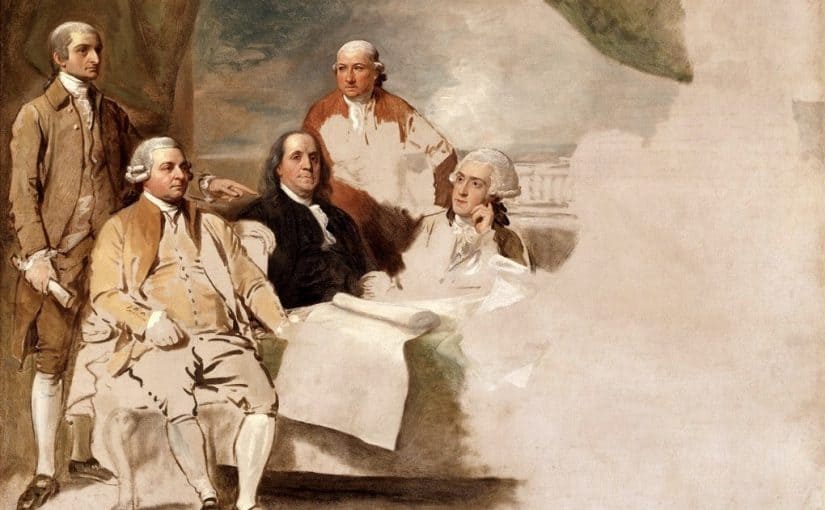Principles of Liberty: Ten Biblical Truths Embedded in the Declaration of Independence
A Five-Session Bible Study
Teaching Plan for Session 5
God Determines Rights and Gives Government the Job of Protecting Them
In this series of Bible studies, we are exploring ten Christian elements in the Declaration of Independence, ten ideals that are thoroughly biblical but not always recognized as such in our day. In fact, modern non-Christian influences have so redefined and reinterpreted words and concepts that in some cases, contemporary Americans completely misunderstand what the Founders intended. A Word Foundations article titled “Principles of Liberty” is foundational to this series.

A PDF file of the above graphic is available here.
It’s high time we rediscover the true meaning of these principles and that we contend anew for them as the Founders understood them. In our study, we are highlighting words and phrases from the most quoted portion of the Declaration, then we’re demonstrating how they’re linked to Scripture and to biblical truth. In each session we’re considering two principles.
Here are the principles we’re examining in Session 5.
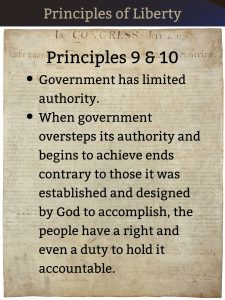
A PDF file of the above graphic is available here.
-
- Read the background information for the session. Be aware it provides a good bit more information than you will use in the session. Also, some of the same material in the background information article and in this teaching plan have been packaged a bit differently. Do not worry. You won’t find any areas of conflict—only areas of overlap.
- If desired, briefly review the first eight principles. Remind participants, or share with them if you haven’t already, that the main article on which this series is based can be found at www.wordfoundations.com/principlesofliberty.
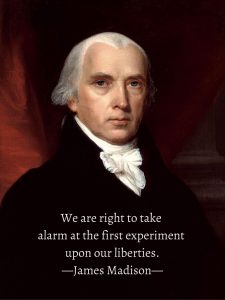 Highlight the ninth principle for the members of your class: Government has limited authority. Emphasize that this ideal of limited government was very important to the founders. Patrick Henry said, “[Our Constitution] is an instrument for the people to restrain the government.” James Madison declared, “We are right to take alarm at the first experiment upon our liberties.” Thomas Jefferson said this: “A wise and frugal Government, which shall restrain men from injuring one another, which shall leave them otherwise free to regulate their own pursuits of industry and improvement, and shall not take from the mouth of labor the bread it has earned. This is the sum of good government, and this is necessary to close the circle of our felicities.” A PDF file of the accompanying graphic is available here.
Highlight the ninth principle for the members of your class: Government has limited authority. Emphasize that this ideal of limited government was very important to the founders. Patrick Henry said, “[Our Constitution] is an instrument for the people to restrain the government.” James Madison declared, “We are right to take alarm at the first experiment upon our liberties.” Thomas Jefferson said this: “A wise and frugal Government, which shall restrain men from injuring one another, which shall leave them otherwise free to regulate their own pursuits of industry and improvement, and shall not take from the mouth of labor the bread it has earned. This is the sum of good government, and this is necessary to close the circle of our felicities.” A PDF file of the accompanying graphic is available here.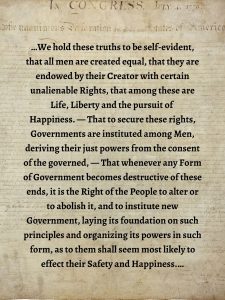 THE DECLARATION (items 4 and 5): Direct participants’ attention to this portion of the Declaration of Independence: We hold these truths to be self-evident, that all men are created equal, that they are endowed by their Creator with certain unalienable Rights, that among these are Life, Liberty and the pursuit of Happiness. — That to secure these rights, Governments are instituted among Men, deriving their just powers from the consent of the governed, — That whenever any Form of Government becomes destructive of these ends, it is the Right of the People to alter or to abolish it, and to institute new Government, laying its foundation on such principles and organizing its powers in such form, as to them shall seem most likely to effect their Safety and Happiness. A PDF file of the above graphic is available here.
THE DECLARATION (items 4 and 5): Direct participants’ attention to this portion of the Declaration of Independence: We hold these truths to be self-evident, that all men are created equal, that they are endowed by their Creator with certain unalienable Rights, that among these are Life, Liberty and the pursuit of Happiness. — That to secure these rights, Governments are instituted among Men, deriving their just powers from the consent of the governed, — That whenever any Form of Government becomes destructive of these ends, it is the Right of the People to alter or to abolish it, and to institute new Government, laying its foundation on such principles and organizing its powers in such form, as to them shall seem most likely to effect their Safety and Happiness. A PDF file of the above graphic is available here.- Ask the members of you class what statements, clauses, phrases, or words indicate that the signers of the Declaration of Independence believed that government’s authority should be limited. You likely will be discussing such phrases/clauses as these: • 1) “to secure these rights, Governments are instituted among Men”; • 2) “deriving their just powers from the consent of the governed”; • 3) “whenever any Form of Government becomes destructive of these ends, it is the Right of the People to alter or to abolish it, and to institute new Government.”
- THE SCRIPTURES (items 6 and 7): Explain that two key passages of Scripture that demonstrate 1) the duty of Christians before God in relation to government, and 2) the purpose of government are Romans 13:1-7 and 1 Peter 2:13-17. Ask your class members to turn to these passages in their Bibles, keeping the Romans passage open and marking the passage in 1 Peter. Ask for a volunteer to read Romans 13:1-7 and another volunteer to read 1 Peter 2:13-17.
- Distribute a copy of this handout to each class member. Explain that here is a thorough but not an exhaustive list of observations arising from a study of Romans 13:1-7 and 1 Peter 2:13-17. Ask a volunteer to read the first item on the list. Ask the next volunteer to read the next item, until all 11 items have been read. Then briefly discuss how these items support the ideal of limited government. Encourage participants to reflect later, on their own, on each item in light of the four questions in bold type, as they’re able to follow up on what they’ve learned during the session.
- HOW MUCH OVERLAP DO WE SEE BETWEEN THE FOUNDERS’ PERSPECTIVE AND BIBLICAL TEACHING? (items 8 and 9): Ask: How thoroughly does the perspective of the Founders on government align with biblical teaching?
- After a brief discussion, share these three points from the background information article for this session. Point out that on the matter of limited government, alignment between the Founders’ perspective and biblical teaching is genuine.
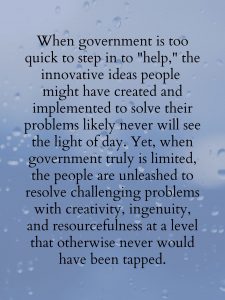 Summarize the advantages of limited government by pointing out that when government is too quick to step in to “help,” the innovative ideas people might have created and implemented to solve their problems likely never will see the light of day. Yet, when government truly is limited, the people are unleashed to resolve challenging problems with creativity, ingenuity, and resourcefulness at a level that otherwise never would have been tapped. A PDF file of the accompanying graphic is available here.
Summarize the advantages of limited government by pointing out that when government is too quick to step in to “help,” the innovative ideas people might have created and implemented to solve their problems likely never will see the light of day. Yet, when government truly is limited, the people are unleashed to resolve challenging problems with creativity, ingenuity, and resourcefulness at a level that otherwise never would have been tapped. A PDF file of the accompanying graphic is available here.- Play for your group this Prager University video. It’s titled “The Chicago Fire: America at Its Best.” The video is five minutes and thirty-seven seconds in length, and it illustrates the superiority of human ingenuity over government solutions in times of desperate need. Government may have a legitimate role to play in various situations, but typically, in recent decades, it repeatedly has acted beyond its authority and areas of legitimate responsibility.
- Indicate you’re moving on to consider the tenth and final principle on the list: When government oversteps its authority and begins to achieve ends contrary to those it was established and designed by God to accomplish, the people have a right and even a duty to hold it accountable.
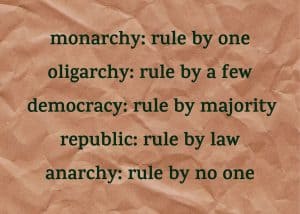 Ask: Where do we see this principle in Romans 13:1-7 and 1 Peter 2:13-17? Explain that in these two passages it is implicit. Two factors bring this principle into focus for us as American Christians today. First, government’s assignment is clear, and its authority has been delegated by God. Therefore, no government has absolute authority. Second, Americans live in a constitutional republic, where laws ultimately are to rule, not leaders. In other words, leaders are to be under under the law, just as are the citizens. When leaders rule unlawfully, Christians and non-Christians alike are right to hold them accountable—at the ballot box and by influencing public opinion by making their case to the people. While it’s true that both Christians and non-Christians are right to do this, we as Christians are especially motivated to do it because we recognize God’s authority and God’s law as supreme. A PDF file of the above graphic is available here.
Ask: Where do we see this principle in Romans 13:1-7 and 1 Peter 2:13-17? Explain that in these two passages it is implicit. Two factors bring this principle into focus for us as American Christians today. First, government’s assignment is clear, and its authority has been delegated by God. Therefore, no government has absolute authority. Second, Americans live in a constitutional republic, where laws ultimately are to rule, not leaders. In other words, leaders are to be under under the law, just as are the citizens. When leaders rule unlawfully, Christians and non-Christians alike are right to hold them accountable—at the ballot box and by influencing public opinion by making their case to the people. While it’s true that both Christians and non-Christians are right to do this, we as Christians are especially motivated to do it because we recognize God’s authority and God’s law as supreme. A PDF file of the above graphic is available here.- Point out that you and your class members already have seen, in this and in previous sessions as well, that the Founders believed it was their duty to call out government and governmental leaders who abused their authority. Share this quote from the background information article for this session: “Many people mistakenly assume that it was merely, or mainly, ‘taxation without representation‘ that pushed the Colonists to go to war with England and to sever ties with their mother country. However, the Declaration of Independence enumerates ‘27 grievous acts which the king has repeatedly committed to injure the liberty of his subjects in the 13 colonies.’”
- Say something like this: So, keeping the Founders’ convictions, actions, and example in mind, as well as biblical truth, what should be our response today to our government’s having departed from its God-given responsibilities? Emphasize that, given the bedrock foundation the Founders laid as well as numerous other factors, we would not be wise to try to overthrow the US government. Others are working to do this, and if they succeed, anarchy will certainly result. The best approach is to call America back to the principles on which she was founded.
- Ask each participant to pull out his or her phone and to access either https://wordfoundations.com/keys/. This web page also is available at https://discoverbedrocktruth.org/keys/.
- Read, or allow your class members to read, the explanation given at the top of the page: “Part 5 of Francis Schaeffer’s 1977 film series titled How Should We Then Live? is titled ‘The Revolutionary Age.’ Each of the following web pages features a brief clip from that film or a quote from the book carrying the same title. These items highlight broad themes that help us put our entire Bible study series in perspective. Understanding and applying these principles represent important keys to liberty.”
- Explain that Dr. Schaeffer refers to the Reformation, or the Protestant Reformation, in his comments and writings. Share that “The Protestant Reformation was a widespread theological revolt in Europe against the abuses and totalitarian control of the Roman Catholic Church. Reformers such as Martin Luther in Germany, Ulrich Zwingli in Switzerland, and John Calvin in France protested various unbiblical practices of the Catholic Church and promoted a return to sound biblical doctrine. The precipitating event of the Protestant Reformation is generally considered to be Luther’s posting of his Ninety-five Theses on the door of the Wittenberg Church on October 31, 1517.” Explain that the Reformation had a far-reaching influence and impact on the world, especially in Europe.
- Divide the class into two groups. Ask each group to appoint a facilitator who is willing to serve. Ask group 1 to access Justice Lifts the Nations and to follow the instructions there, and ask group 2 to access Lex Rex and to follow the instructions there. Tell groups they may not have time to discuss everything and draft their statements, so they may have to cut their discussion short in order to compose their summary statements.
- After 10-to-15 minutes, ask the facilitator from each group to share his or her group’s statement.
- From www.discoverbedrocktruth.org/keys, visit “A Bedrock Foundation.” Play the audio clip and briefly discuss it.
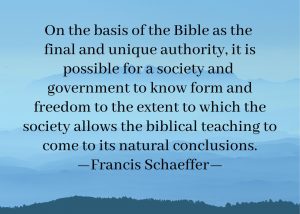 Admit: Yes, this thinking is countercultural. Yet it is the truth, and Jesus said, “[Y]ou shall know the truth, and the truth shall make you free” (John 8:32). A PDF file of the accompanying graphic is available here.
Admit: Yes, this thinking is countercultural. Yet it is the truth, and Jesus said, “[Y]ou shall know the truth, and the truth shall make you free” (John 8:32). A PDF file of the accompanying graphic is available here.- Return, and ask participants to return, to www.discoverbedrocktruth.org/keys/, or www.wordfoundations.com/keys/. Say: There’s one more key for us to consider. What is it? Ask learners scroll down the page until they come to The Fourth Key. Ask them to visit this web page. Ask a volunteer to read the two paragraphs on the page.
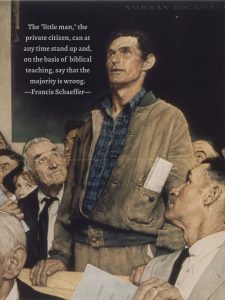 Emphasize: Francis Schaeffer said, “The ‘little man,’ the private citizen, can at any time stand up and, on the basis of biblical teaching, say that the majority is wrong.” Discuss how earthshaking and revolutionary this concept is, especially in our day.
Emphasize: Francis Schaeffer said, “The ‘little man,’ the private citizen, can at any time stand up and, on the basis of biblical teaching, say that the majority is wrong.” Discuss how earthshaking and revolutionary this concept is, especially in our day.- Explain that this doesn’t mean Christians will be effective going around and quoting Scripture in public arbitrarily. Don’t misunderstand: I’m not saying there isn’t a place for ministries like those of street preachers (these men don’t quote Scriptures arbitrarily, anyway). What I am saying is that this statement, this observation from Dr. Schaeffer, should boost our convictions and confidence. We need to contend for biblical truth in every sphere of influence. Sometimes this will mean going directly to Scripture outright, but I think more often it will mean citing evidence for biblical principles in the arena of ideas and then connecting that evidence to its biblical foundation. A PDF file of the above graphic is available here.
- Here’s an example. Look at the societal unraveling that has taken place in recent weeks and months—the riots, the looting, the disorderly conduct. In instances where police brutality has occurred, it should be punished to the fullest extent of the law. Yet the lawlessness among the rioters has devastated innocent lives and wrecked people’s freedom. It ought to be easier than ever for people to see that adherence to the Ten Commandments is essential for ordered liberty. Even if our secular neighbors can’t see this, people in our churches should able to! And we need to make sure our children understand it as well. We can start there, but let’s talk about this in our churches, too, as well as in the culture at large.
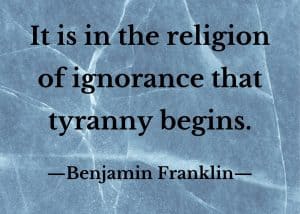 Share this quote from Benjamin Franklin: “
Share this quote from Benjamin Franklin: “- Emphasize that here are other things we can do, as well. Distribute a copy of “A Manifesto for American Renewal” to each learner and ask each one to follow up by reading it during the next week. The material has been lifted from the background information article for this session.
If time allows, show this six-minute film on the 56 signers of the Declaration of Independence.
Conclusion:
Ask participants to allow Francis Schaeffer’s insight to continue to ring in their heads.
“The ‘little man,’ the private citizen, can at any time stand up and, on the basis of biblical teaching, say that the majority is wrong.”
Say:
This is true because God really does exist, has created an ordered and moral universe, and holds people accountable. It’s also true because absolute truths exist and are knowable.
Thus, we have come full circle, for these principles are the first and second principles on our list.
Close in prayer, thanking God for the 1) His revelation of truth, 2) the Founding Fathers and their biblical convictions, and 3) the biblical principles on which America was founded. Further, pray for spiritual awakening and renewal in America as you and the members of your group—and others—seek to apply biblical truth to every area of life, even as the signers of the Declaration of Independence did in theirs.
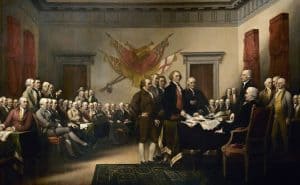
Copyright © 2020 by B. Nathaniel Sullivan. All rights reserved.
Unless otherwise indicated, Scripture has been taken from the New King James Version®. Copyright © 1982 by Thomas Nelson, Inc. Used by permission. All rights reserved.
top image credit: The United States delegation at the 1783 Treaty of Paris included John Jay, John Adams, Benjamin Franklin, Henry Laurens, and William Temple Franklin. Here they are depicted by Benjamin West in his 1783 American Commissioners of the Preliminary Peace Agreement with Great Britain. The British delegation refused to pose and the painting was never completed.
